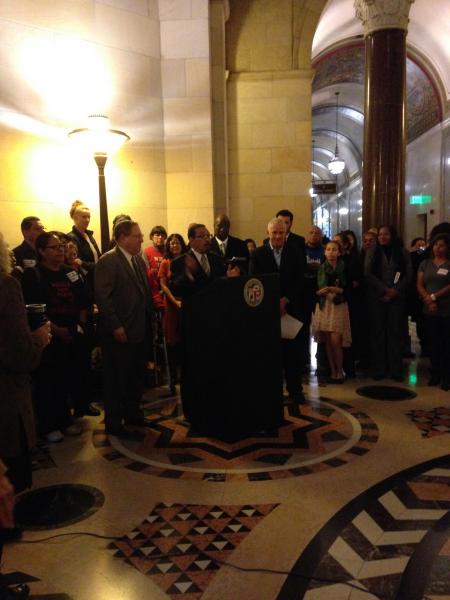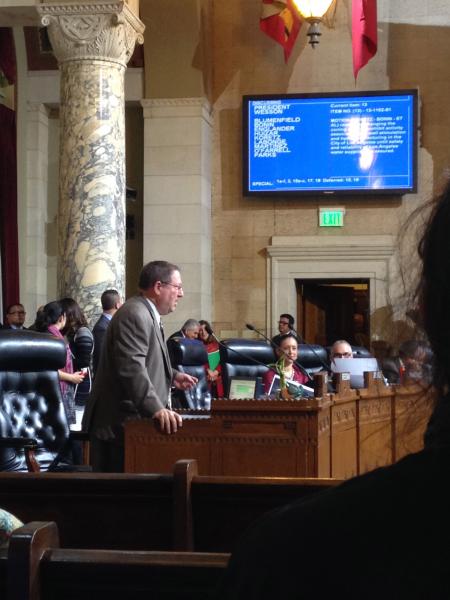Los Angeles Triumphs In City-Wide Fracking Ban

Sanity triumphed over greed. The Los Angeles City Council on Friday, February 28th, approved the Moratorium on Hydraulic Fracturing, aka fracking, despite intense pressure from L.A. pro-business groups and the Western States Petroleum Association.
Fracking is the oil and gas retrieval process that injects water, sand and toxic chemicals deep into layers of rock. L.A. is the first city in California, and the largest city in the country, to ban fracking and related activities until oil companies can prove that they are not harming public safety or contaminating groundwater.
SEE ALSO: Los Angeles Residents Rejoice City Council's Fracking Moratorium
As an intern at Food & Water Watch, I have been working alongside the three people who inspired this bill. We believed that we had about two more months before it would be placed on the agenda at City Hall to be voted on. A huge amount of work had gone into gaining support from City Council members—speaking with community groups, gaining backing from neighborhood councils, church groups, etc. To our surprise, there was so much pressure at a related City Hall meeting last Friday that the council president, Herb Wesson, scheduled the vote for this week. When I heard this news, I felt ill. We weren’t ready, and were unsure if the bill would make it through the first committee vote.
After a weekend of hard work on behalf of Food & Water Watch, partner organizations, and countless individuals from the community, about 280 people attended the first committee vote on Tuesday, by Planning and Land Use Management (PLUM).
To our disbelief and pleasure, it passed unanimously. A week beforehand, I had thought the bill would be dead at that stage. After passing through PLUM, the bill was scheduled for a full council vote on Friday. It was hard to accept that this fight was going to be won or lost so quickly.

Friday morning at 9:00 a.m., a press conference was held inside City Hall. Council members Paul Koretz and Mike Bonin, who co-sponsored the bill, spoke passionately about the reasons the bill needed to pass on Friday. Bonin stressed that there is something wrong with allowing oil and gas companies to use millions of gallons of water to frack when California is in the midst of one of it’s worst droughts. He also made a point about injecting water and chemicals into the ground of a city prone to earthquakes.
In his own words, “Something is wrong with that!”
The council members said they hoped to pass the ban in L.A., and have a similar ban pass in the California state legislature. Currently, state Senators Holly Mitchell (D-Los Angeles) and Mark Leno (D-San Francisco) are sponsoring a bill to place a moratorium on all of California.
The press conference and council vote drew people from all over L.A. Buses of people came from the West Adams community, where a new drilling site just opened. Students from the USC Environmental Affairs Organization came to support the ban; there are currently two wells within walking distance of USC.
SEE ALSO: Gas-Holes: Acidizing Continues To Threaten USC-Area Residents
In total, about 300 people showed up for the vote. There were not enough seats, but that didn’t stop more people from filing into the room. I don’t spend a lot of time in the City Council voting chamber, but my guess is that this is a rare occurrence. The excitement and tension coming from the large audience was palpable. When agenda item #13, the L.A. moratorium on fracking, came up, five of the fifteen council members were not in their seats. This made me uneasy. The vote was about to take place, and it was apparent that five council members were not supportive of the bill. However, after what seemed like an eternity, two large screens in the front of the room displayed the names of the 10 council members present and their votes on the motion: unanimous in favor of the moratorium. Joy erupted from the crowd who had come in hopes of celebrating this decision, disrupting the City Hall voting chamber with their loud cheers and excitement.
I have high expectations for the anti-fracking movement in California. The Los Angeles ban adds momentum to an already powerful and energetic movement. Most Californians oppose fracking, and legislators are feeling the heat, either from their constituents or from the methane released from fracking wells in their districts. The fact that five city council members abstained from the vote makes a loud statement. Even though they were not supportive of the bill, they recognized that there was so much public support that voting no would have reflected poorly upon them. Voting against the safety of constituents, in favor of corporate interests, is not looked on kindly.
Fight on California, fight on.



